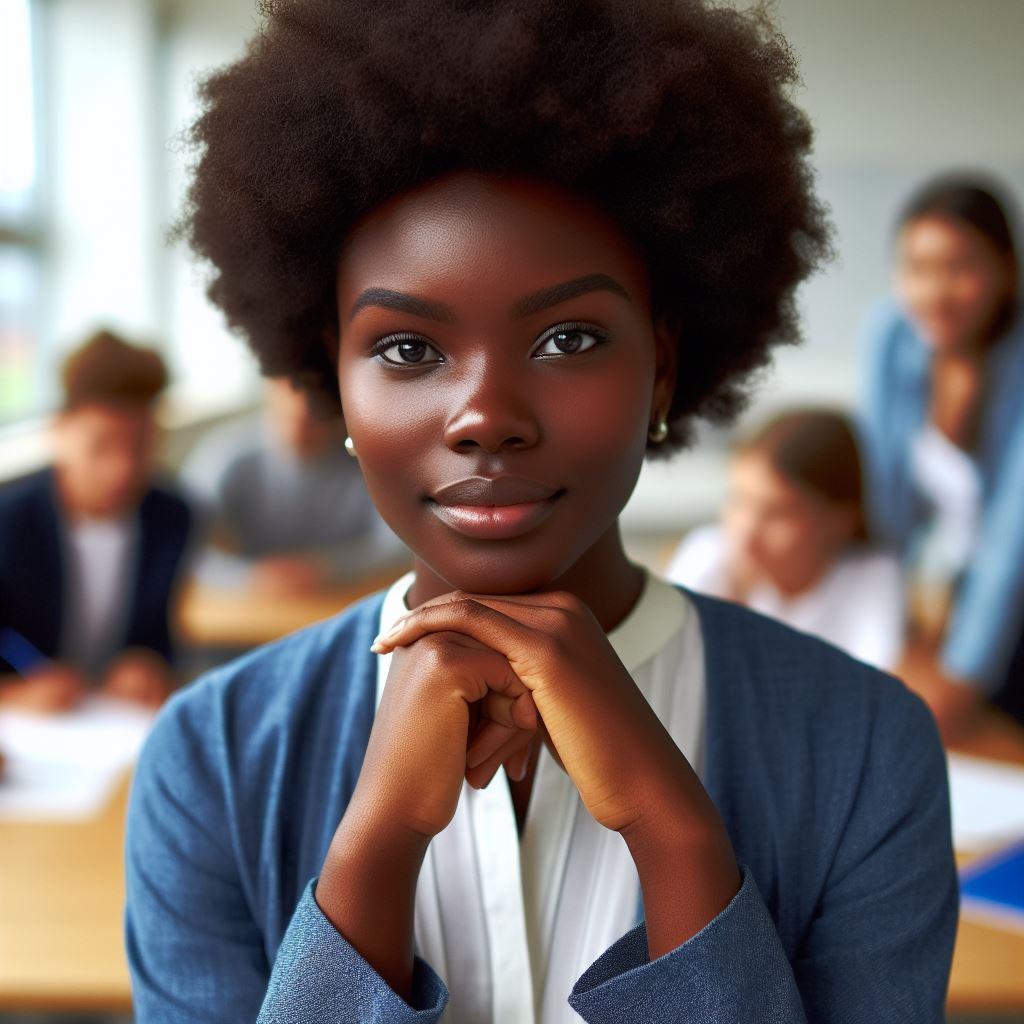Introduction
In Nigerian schools, Physical Education (PE) is vital for holistic student development.
It encompasses various activities that promote physical fitness, coordination, and teamwork.
PE goes beyond mere exercise; it fosters discipline, resilience, and a healthy lifestyle among students.
The importance of PE cannot be overstated. It contributes to the physical, mental, and emotional well-being of students.
Engaging in regular physical activity enhances concentration, reduces stress, and improves mood.
Moreover, PE instills lifelong habits of exercise and promotes overall health, thereby reducing the risk of chronic diseases like obesity and diabetes.
Currently, PE in Nigerian schools faces challenges but also holds promise.
While some schools prioritize PE, others struggle with limited resources and curriculum constraints.
However, initiatives such as the National Policy on Education and the Basic Education Curriculum emphasize the importance of PE and seek to integrate it more comprehensively into school programs.
Despite these efforts, there is room for improvement. Many schools lack adequate facilities, trained instructors, and structured PE programs.
Additionally, cultural attitudes towards physical activity may vary, impacting the prioritization of PE in schools.
Moving forward, it is essential to address these challenges and enhance the role of PE in Nigerian schools.
This can be achieved through increased investment in infrastructure, training of PE teachers, and the development of standardized PE curriculum.
Moreover, collaboration between government, schools, parents, and communities is crucial to promoting a culture of physical activity and ensuring the well-rounded development of Nigerian students.
In essence, PE plays a pivotal role in Nigerian schools, contributing to the holistic development of students.
While challenges exist, efforts to improve PE implementation are underway, aiming to foster a healthier and more active generation of Nigerian youth.
History of Physical Education in Nigeria
Physical education in Nigeria has a rich history that dates back to the pre-colonial era.
Traditional Nigerian societies emphasized physical activities as a means of maintaining fitness and preparing individuals for various roles in the community.
These activities ranged from wrestling, hunting, and farming to communal dances and rituals that required physical strength and endurance.
With the advent of colonialism in the late 19th century, the British influence on Nigerian education systems also impacted the approach to physical education.
The introduction of Western education brought new forms of physical activities, including sports like cricket, soccer, and track and field events.
Schools began incorporating physical education classes alongside academic subjects, emphasizing the importance of physical fitness for overall well-being.
Post-independence Nigeria saw significant developments in the field of physical education as the country sought to establish its identity and promote a culture of health and fitness.
The government recognized the importance of physical education in schools and implemented policies to encourage sports participation and physical activities among students.
Evolution of Physical Education in Nigerian Schools
Over the years, physical education in Nigerian schools has evolved to encompass a wider range of activities and sports.
From traditional games and exercises to modern sports and fitness programs, schools now offer a more diverse and comprehensive approach to physical education.
This evolution reflects the changing needs and interests of students in a rapidly evolving society.
Physical education curriculum in Nigerian schools has become more structured and organized, with specific learning objectives and outcomes.
Students are exposed to a variety of physical activities aimed at developing their motor skills, coordination, strength, and overall fitness.
The emphasis is not only on competitive sports but also on recreational activities that promote lifelong physical well-being.
Influence of Colonialism and Post-Independence Eras on Physical Education
The influence of colonialism on physical education in Nigeria cannot be understated.
The British colonial rulers introduced new sports and physical activities, which became integrated into the Nigerian education system.
This influence laid the foundation for modern physical education programs in schools and helped shape the way physical fitness is perceived in Nigerian society.
Post-independence Nigeria witnessed a renewed focus on physical education as the country sought to assert its cultural identity and promote health and fitness among its citizens.
The government invested in sports facilities, training programs, and initiatives to encourage sports participation and physical activities at all levels of society.
This focus on physical education continues to drive national policies and programs aimed at promoting active and healthy lifestyles.
Major Milestones in the Development of Physical Education in Nigerian Schools
Several key milestones have marked the development of physical education in Nigerian schools.
The establishment of sports councils, the introduction of national sports festivals, the integration of physical education into school curricula, and the promotion of sports scholarships are all significant events that have contributed to the growth of physical education in the country.
Changes in the approach to physical education have also been evident in the shift towards a more holistic and inclusive approach.
Schools now recognize the importance of catering to the diverse needs and interests of students, promoting sportsmanship, teamwork, and physical fitness for all.
Transform Your Career with Expert Guidance
Get personalized mentorship consulting that’s tailored to your unique path. Our expert advice is actionable and exclusive.
Get StartedThis shift reflects a broader understanding of physical education as an essential component of a well-rounded education.
In fact, the history of physical education in Nigerian schools is a testament to the evolution and significance of physical activities in shaping the well-being of individuals and communities.
From traditional exercises to modern sports, physical education has played a vital role in promoting health, fitness, and overall development among students in Nigeria.
Read: Challenges in Physical and Health Education in Nigeria
Curriculum and Structure of Physical Education in Nigerian Schools
In Nigeria, Physical Education plays a crucial role in the overall development of students.
The curriculum is designed to promote healthy lifestyles, build physical skills, and instill values such as teamwork and sportsmanship.
Overview of the current Physical Education curriculum in Nigerian schools
The current Physical Education curriculum in Nigerian schools focuses on a holistic approach to health and wellness.
It includes a mix of theoretical and practical components, with emphasis on sports, games, and fitness activities.
Students are taught the importance of regular exercise, proper nutrition, and maintaining a healthy lifestyle.
They learn about the benefits of physical activity for both physical and mental well-being.
Furthermore, the curriculum integrates topics such as anatomy, physiology, and sports psychology to provide students with a well-rounded understanding of the human body and its capabilities.
Components of Physical Education programs, including sports, games, fitness activities, etc.
Physical Education programs in Nigerian schools include a variety of sports, games, and fitness activities to cater to the diverse interests and abilities of students.
Some common components of these programs are:
- Team sports like football, basketball, volleyball, and handball
- Individual sports such as athletics, swimming, and tennis
- Traditional Nigerian games like Ayo, Dambe, and Langa
- Fitness activities like aerobics, yoga, and circuit training
These activities are designed to not only improve physical fitness but also to develop important skills such as coordination, agility, and decision-making.
Students are encouraged to participate in a mix of team and individual activities to foster holistic development.
Role of teachers and instructors in delivering Physical Education to students
Teachers and instructors play a vital role in delivering Physical Education to students in Nigerian schools.
They are responsible for creating a safe and supportive learning environment where students can develop their physical skills and knowledge.
Teachers design lessons that cater to the diverse needs and abilities of students, ensuring that each individual has the opportunity to excel in their chosen activities.
They provide guidance, motivation, and feedback to help students improve their performance and achieve their goals.
Instructors organize sports competitions, fitness challenges, and recreational activities to make Physical Education engaging and enjoyable for students.
They also promote values like fair play, respect, and teamwork to instill important life skills in students.
Overall, teachers and instructors play a crucial role in shaping the physical, social, and emotional well-being of students through Physical Education in Nigerian schools.
Read: Benefits of Studying Physical and Health Education
Benefits of Physical Education for Students
Physical education plays a crucial role in the holistic development of students.
It goes beyond just physical fitness and encompasses mental, emotional, and social well-being.
Here are some of the key benefits that students can derive from regular participation in physical education classes:
Physical Health Benefits
- Improved Fitness Levels: Engaging in physical activities during PE classes helps students improve their cardiovascular health, strength, flexibility, and overall fitness levels.
- Reduced Risk of Obesity: Regular physical activity can help students maintain a healthy weight and reduce the risk of obesity-related health issues.
Mental Health Benefits
- Stress Relief: Physical exercise is known to release endorphins, the “feel-good” hormones, which can help reduce stress and anxiety levels in students.
- Improved Mood: Regular physical activity can boost mood, increase energy levels, and promote better concentration and focus in academic tasks.
Social Benefits
- Teamwork: PE classes often involve team sports and activities that promote collaboration, communication, and cooperation among students.
- Sportsmanship: Students learn how to win and lose gracefully, respect opponents, and follow rules and regulations, fostering good sportsmanship values.
- Leadership Skills Development: Through group activities and games, students have the opportunity to take on leadership roles, make decisions, and motivate their peers.
In short, physical education not only helps students stay physically active and healthy but also contributes to their overall well-being by improving their mental health, boosting social skills, and enhancing their academic performance.
Read: Curriculum for Physical and Health Education in Nigeria

Challenges and Issues Facing Physical Education in Nigerian Schools
Limited resources and facilities for implementing Physical Education programs
One of the major challenges facing Physical Education in Nigerian schools is the lack of adequate resources and facilities to support the implementation of effective PE programs.
Many schools lack proper sports equipment, playing fields, and other essential resources needed for students to engage in physical activities.
This hinders the quality of PE programs and limits the opportunities for students to develop their physical abilities.
Lack of trained instructors and teachers in Physical Education
Another significant issue is the shortage of qualified and trained instructors and teachers in the field of Physical Education.
Many schools struggle to find educators with the necessary expertise and knowledge to effectively teach PE classes and promote physical fitness among students.
This lack of skilled professionals results in subpar PE programs that fail to engage students and instill a love for physical activity.
Cultural and societal factors that may hinder the promotion of Physical Education in schools
Cultural beliefs and societal norms can also pose challenges to the promotion of Physical Education in Nigerian schools.
Some communities may prioritize academic achievements over physical fitness, leading to a devaluation of PE programs and extracurricular sports activities.
Additionally, cultural taboos or restrictions on certain types of physical activities may limit the opportunities for students to participate in PE classes and sports events.
Overall, addressing these challenges and issues requires a coordinated effort from educational authorities, policymakers, school administrators, and the community.
By investing in better resources, training qualified instructors, and promoting a culture of physical fitness, Nigerian schools can overcome these obstacles and provide students with opportunities to lead healthier and more active lives.
Read: Career Opportunities in Physical and Health Education
Strategies for Enhancing Physical Education in Nigerian Schools
Importance of Government Support and Funding for Physical Education Programs
Government support and funding are crucial for the sustenance and growth of physical education programs in Nigerian schools.
The government plays a vital role in providing resources and infrastructure to promote physical education among students.
- Allocation of Budget: The government should allocate a sufficient budget specifically earmarked for physical education programs in schools.
This will ensure that schools have the necessary resources to conduct sports activities and provide adequate sports equipment. - Infrastructure Development: Government support is essential for the construction and maintenance of sports facilities in schools.
This includes building playgrounds, sports fields, and indoor sports facilities to facilitate various physical activities for students. - Professional Development: The government should invest in training programs for physical education teachers to enhance their skills and knowledge.
This will enable teachers to deliver quality physical education lessons and motivate students to participate in sports activities. - Collaboration with Sports Organizations: The government can collaborate with sports organizations to provide coaching and mentorship programs for students interested in pursuing sports at a competitive level.
This will help in identifying and nurturing talent among students.
Training and Professional Development Opportunities for Physical Education Teachers
Continuous training and professional development opportunities are essential for physical education teachers to enhance their teaching skills and keep up with current trends in sports education.
- Workshops and Seminars: Physical education teachers should attend workshops and seminars conducted by educational institutions or sports organizations.
These events provide insights into new teaching methodologies and techniques for effective sports instruction. - Certification Programs: Teachers can enroll in certification programs to obtain specialized training in specific sports disciplines or coaching techniques.
This certification enhances their professional credentials and enables them to provide quality instruction to students. - Mentorship Programs: Experienced physical education teachers can act as mentors to junior teachers, providing guidance and support in lesson planning, curriculum development, and student assessment.
This mentorship helps in improving teaching standards across schools. - Collaboration with Coaches: Physical education teachers can collaborate with sports coaches to learn advanced coaching techniques and strategies.
This collaboration fosters a culture of continuous learning and skill development among teachers.
Integration of Technology and Innovative Teaching Methods to Make Physical Education More Engaging for Students
Integrating technology and innovative teaching methods can make physical education more enjoyable and engaging for students, leading to improved performance and participation in sports activities.
- Use of Wearable Technology: Teachers can incorporate wearable technology such as fitness trackers and heart rate monitors to track students’ physical activity levels and provide real-time feedback.
This enhances students’ motivation and involvement in sports. - Interactive Games and Apps: Teachers can utilize interactive games and apps that promote physical activity and competitive sports among students.
These platforms make learning fun and encourage teamwork and sportsmanship. - Virtual Reality (VR) Training: VR technology can be used to create simulated sports environments where students can practice and refine their skills in a safe and controlled setting.
This immersive experience enhances learning and performance in sports. - Flexible Learning Modules: Teachers can design flexible learning modules that cater to different learning styles and abilities.
By incorporating varied teaching methods, such as project-based learning or peer tutoring, students can engage actively in physical education classes.
Find Out More: Nigerian Government Initiatives in ICT Education
Conclusion
Physical education plays a vital role in Nigerian schools, promoting physical fitness, overall health, and personal development.
It also enhances social skills, teamwork, and discipline among students, preparing them for success in various aspects of life.
Stakeholders, including government authorities, school administrators, teachers, and parents, must prioritize and support physical education programs.
By doing so, they can empower Nigerian students to lead healthier lifestyles and excel in academics and extracurricular activities.
In conclusion, a well-rounded physical education curriculum has the potential to positively impact the holistic development of Nigerian students.
It is essential to recognize the importance of physical education and its long-lasting benefits for the well-being of the younger generation.
Therefore, a call to action is crucial for all stakeholders to collaborate and implement effective physical education strategies in Nigerian schools.




